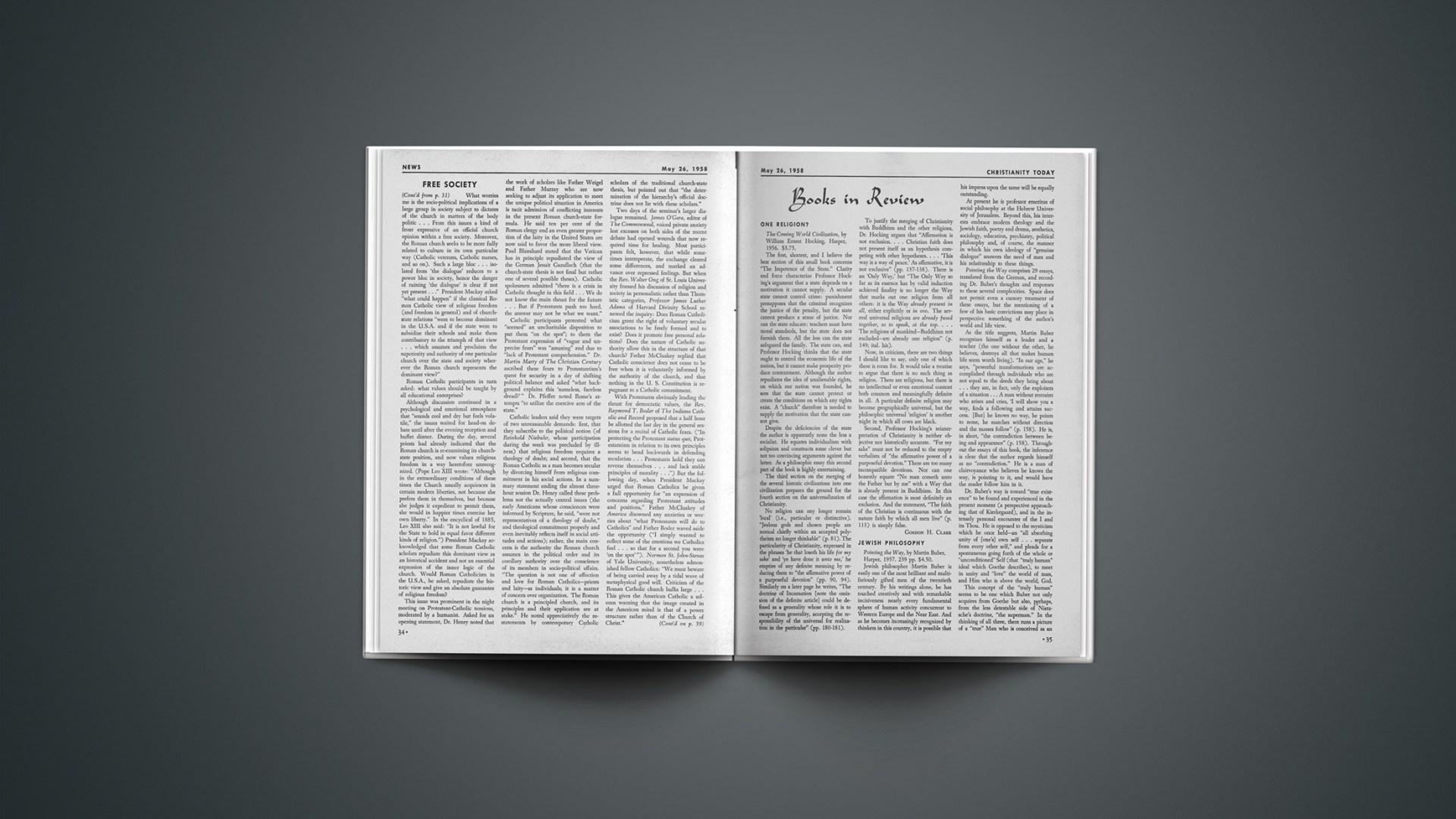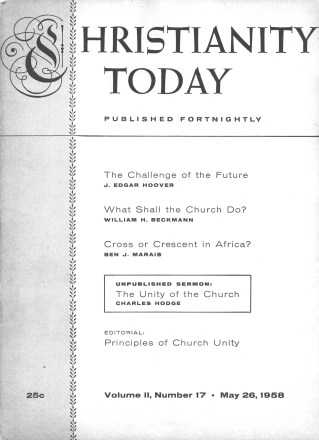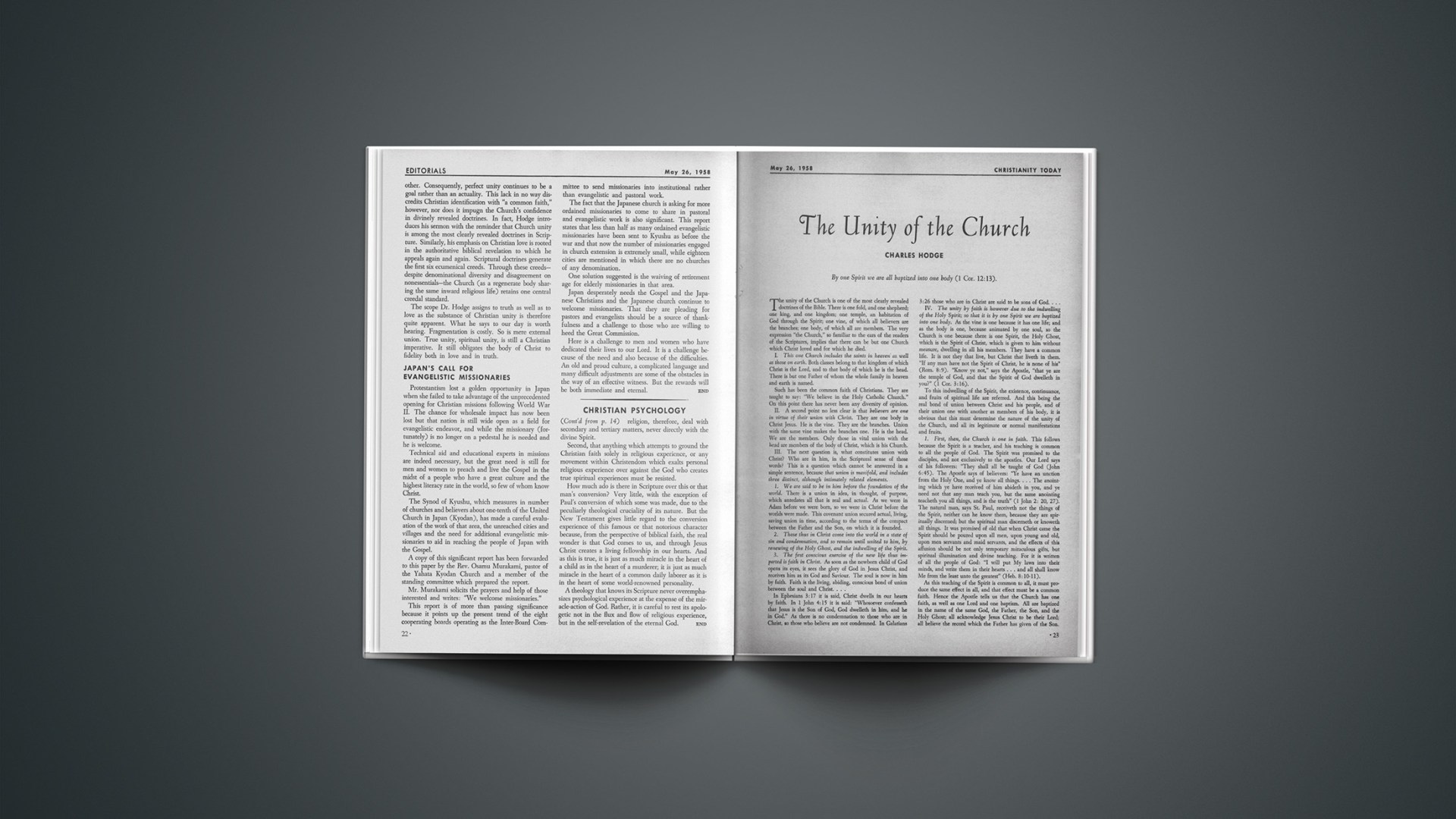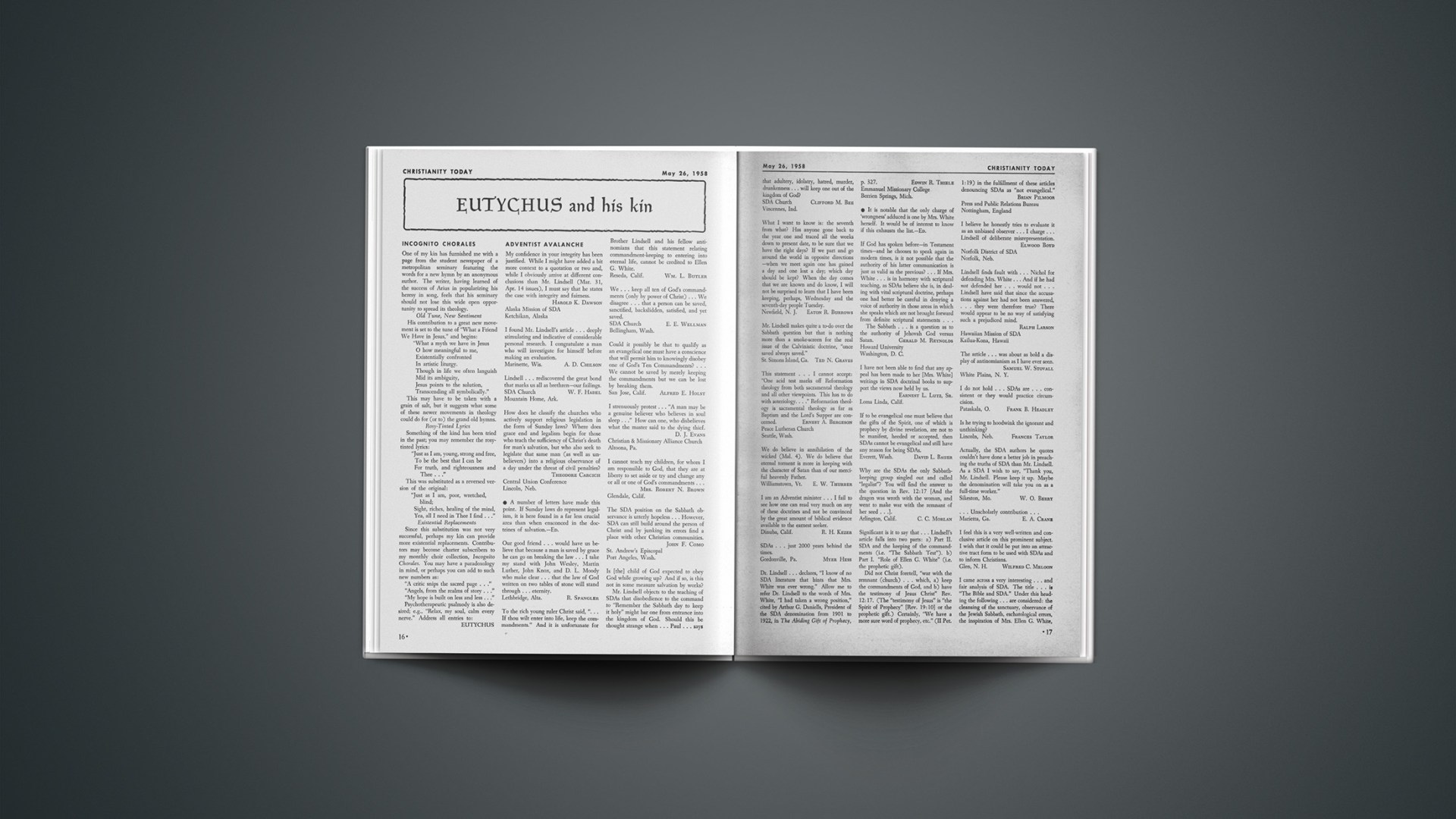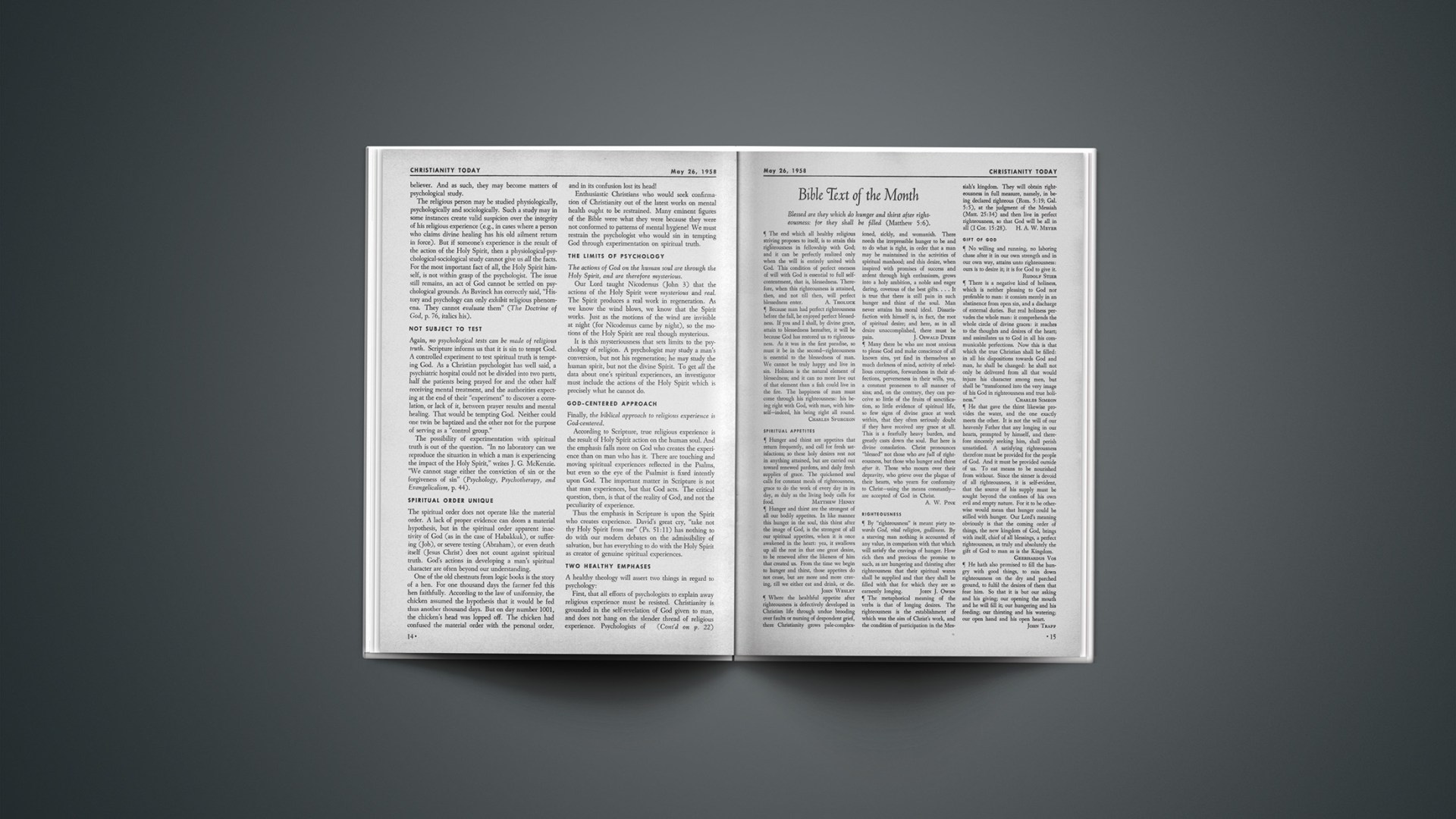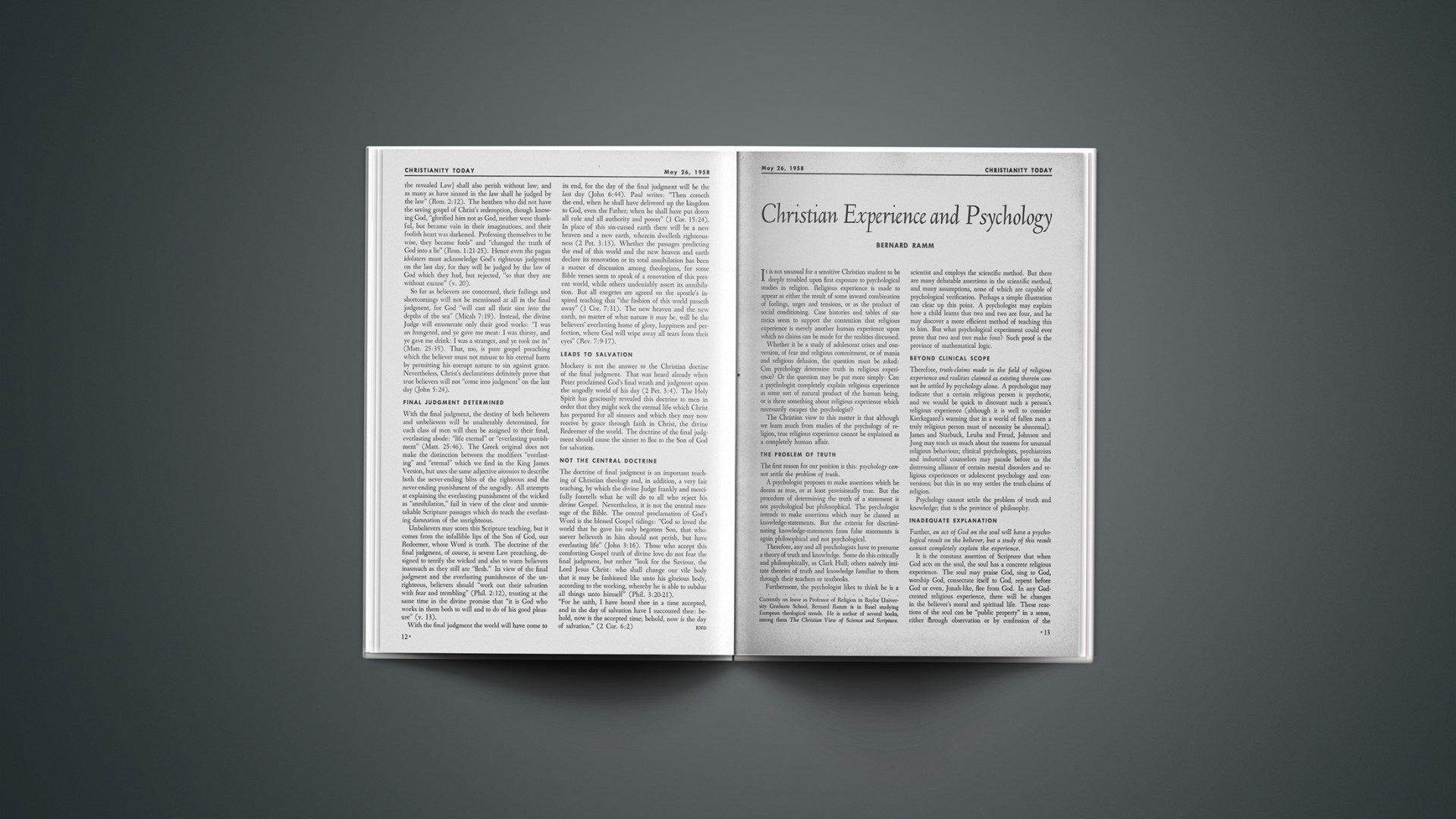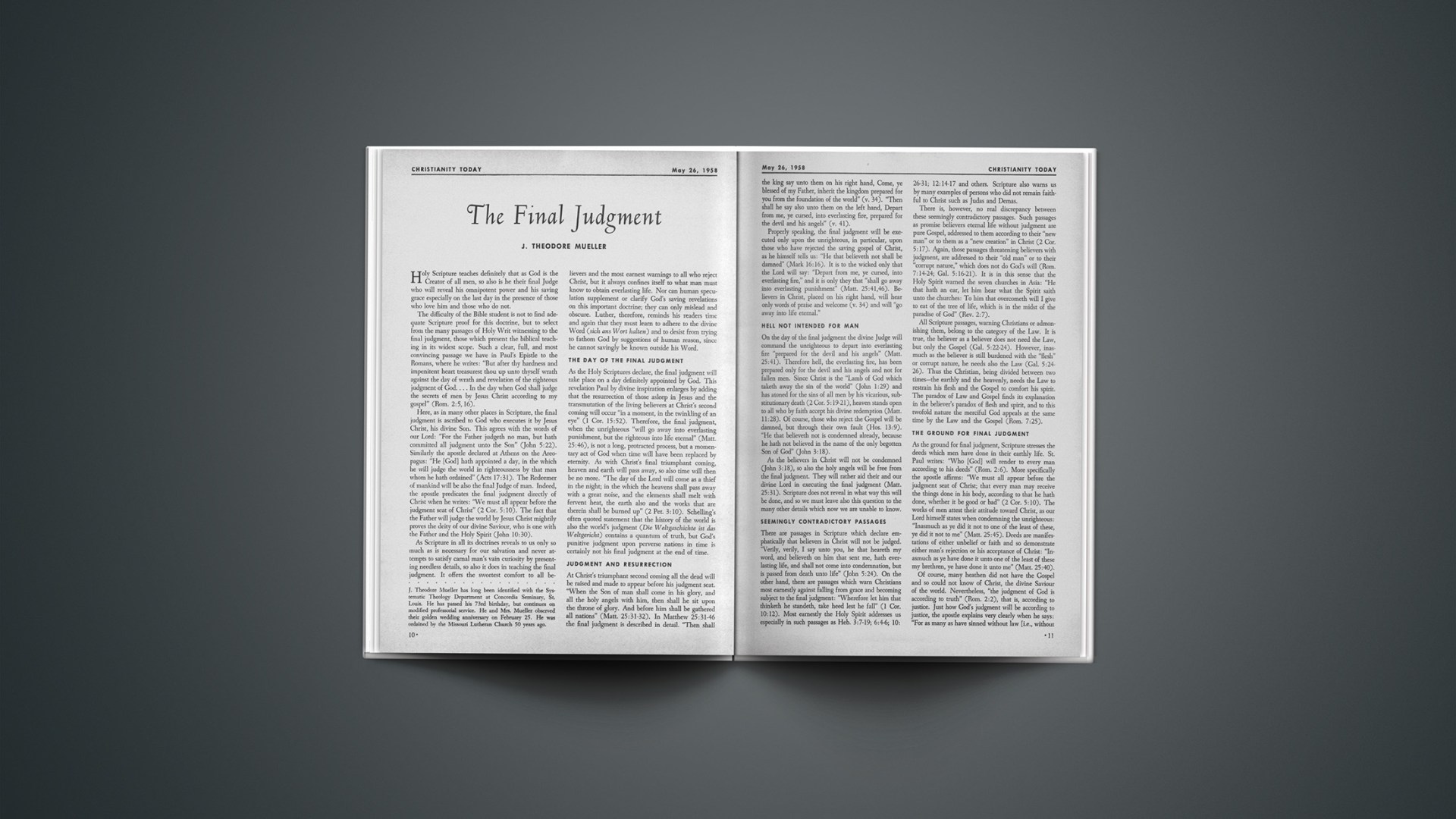One Religion?
The Coming World Civilization, by William Ernest Hocking, Harper, 1956. $3.75.
The first, shortest, and I believe the best section of this small book concerns “The Impotence of the State.” Clarity and force characterize Professor Hocking’s argument that a state depends on a motivation it cannot supply. A secular state cannot control crime: punishment presupposes that the criminal recognizes the justice of the penalty, but the state cannot produce a sense of justice. Nor can the state educate: teachers must have moral standards, but the state does not furnish them. All the less can the state safeguard the family. The state can, and Professor Hocking thinks that the state ought to control the economic life of the nation, but it cannot make prosperity produce contentment. Although the author repudiates the idea of unalienable rights, on which our nation was founded, he sees that the state cannot protect or create the conditions on which any rights exist. A “church” therefore is needed to supply the motivation that the state cannot give.
Despite the deficiencies of the state the author is apparently none the less a socialist. He equates individualism with solipsism and constructs some clever but not too convincing arguments against the latter. As a philosophic essay this second part of the book is highly entertaining.
The third section on the merging of the several historic civilizations into one civilization prepares the ground for the fourth section on the universalization of Christianity.
No religion can any longer remain ‘local’ (i.e., particular or distinctive). “Jealous gods and chosen people are normal chiefly within an accepted polytheism no longer thinkable” (p. 81). The particularity of Christianity, expressed in the phrases ‘he that loseth his life for my sake’ and ‘ye have done it unto me,’ he empties of any definite meaning by reducing them to “the affirmative power of a purposeful devotion” (pp. 90, 94). Similarly on a later page he writes, “The doctrine of Incarnation [note the omission of the definite article] could be defined as a generality whose role it is to escape from generality, accepting the responsibility of the universal for realization in the particular” (pp. 180–181).
To justify the merging of Christianity with Buddhism and the other religions, Dr. Hocking argues that “Affirmation is not exclusion.… Christian faith does not present itself as an hypothesis competing with other hypotheses.… ‘This way is a way of peace.’ As affirmative, it is not exclusive” (pp. 137–138). There is an ‘Only Way,’ but “The Only Way so far as its essence has by valid induction achieved finality is no longer the Way that marks out one religion from all others: it is the Way already present in all, either explicitly or in ovo. The several universal religions are already fused together, so to speak, at the top.… The religions of mankind—Buddhism not excluded—are already one religion” (p. 149; ital. his).
Now, in criticism, there are two things I should like to say, only one of which there is room for. It would take a treatise to argue that there is no such thing as religion. There are religions, but there is no intellectual or even emotional content both common and meaningfully definite in all. A particular definite religion may become geographically universal, but the philosophic universal ‘religion’ is another night in which all cows are black.
Second, Professor Hocking’s reinterpretation of Christianity is neither objective nor historically accurate. “For my sake” must not be reduced to the empty verbalism of “the affirmative power of a purposeful devotion.” There are too many incompatible devotions. Nor can one honestly equate “No man cometh unto the Father but by me” with a Way that is already present in Buddhism. In this case the affirmation is most definitely an exclusion. And the statement, “The faith of the Christian is continuous with the nature faith by which all men live” (p. 113) is simply false.
GORDON H. CLARK
Jewish Philosophy
Pointing the Way, by Martin Buber, Harper, 1957. 239 pp. $4.50.
Jewish philosopher Martin Buber is easily one of the most brilliant and multifariously gifted men of the twentieth century. By his writings alone, he has touched creatively and with remarkable incisiveness nearly every fundamental sphere of human activity concurrent to Western Europe and the Near East. And as he becomes increasingly recognized by thinkers in this country, it is possible that his impress upon the same will be equally outstanding.
At present he is professor emeritus of social philosophy at the Hebrew University of Jerusalem. Beyond this, his interests embrace modern theology and the Jewish faith, poetry and drama, aesthetics, sociology, education, psychiatry, political philosophy and, of course, the manner in which his own ideology of “genuine dialogue” answers the need of man and his relationship to these things.
Pointing the Way comprises 29 essays, translated from the German, and recording Dr. Buber’s thoughts and responses to these several complexities. Space does not permit even a cursory treatment of these essays, but the mentioning of a few of his basic convictions may place in perspective something of the author’s world and life view.
As the title suggests, Martin Buber recognizes himself as a leader and a teacher (the one without the other, he believes, destroys all that makes human life seem worth living). “In our age,” he says, “powerful transformations are accomplished through individuals who are not equal to the deeds they bring about … they are, in fact, only the exploiters of a situation … A man without restraint who arises and cries, ‘I will show you a way, finds a following and attains success. [But] he knows no way, he points to none, he marches without direction and the masses follow” (p. 158). He is, in short, “the contradiction between being and appearance” (p. 158). Throughout the essays of this book, the inference is clear that the author regards himself as no “contradiction.” He is a man of clairvoyance who believes he knows the way, is pointing to it, and would have the reader follow him in it.
Dr. Buber’s way is toward “true existence” to be found and experienced in the present moment (a perspective approaching that of Kierkegaard), and in the intensely personal encounter of the I and its Thou. He is opposed to the mysticism which he once held—an “all absorbing unity of [one’s] own self … separate from every other self,” and pleads for a spontaneous going forth of the whole or “unconditioned” Self (that “truly human” ideal which Goethe describes), to meet in unity and “love” the world of man, and Him who is above the world, God.
This concept of the “truly human” seems to be one which Buber not only acquires from Goethe but also, perhaps, from the less detestable side of Nietzsche’s doctrine, “the superman.” In the thinking of all three, there runs a picture of a “true” Man who is conceived as an ideal harmony of both the dynamic, infrarational and the spiritual-ethical rational sides of human nature. And in the mind of Buber, this ideal is something that may, yea must, be realized in every man if he would experience “genuine life”—that unconditioned unity of virtue and body (or, better stated, the spiritual irradiated through the sensuous), and also “genuine dialogue”—the abandoning of this integrated Self in love toward others and toward God. The reviewer suggests that perhaps what Buber desires to see, in Christian terminology, are “saved” men, reconciled to God without Christ, and made perfect in the flesh.
It is within the I and Thou relationship, of course, that man finds truth; although he explains this is not to relativize it: “ultimate truth is one, but is given to man only as he enters, reflected as in a prism, into the true life relationships of persons” (p. 79). And it is within this meeting, this other name for history, that Buber believes man can eventually discover the potentialities for world peace.
As with any thoroughgoing existentialist, as well as humanist in his own stripe, many of Dr. Buber’s concepts are at variance with historical Christianity. He does not, in fact, pretend to be a Christian, for his underlying theology appears as something of an Emil Brunner variety of neo-orthodoxy in Judaism. Nevertheless, it is fair to say that to contemporary thinking he has offered an incisive contribution in his creative emphasis upon love. Love is a unique responsibility of an I for a Thou. “Each man you meet needs help, each needs your help … [and] even when you yourself are in need—and you are—you can help others and, in so doing, help yourself” (p. 110).
Martin Buber possesses extraordinary skill in writing. His literary style varies according to the mood of the essay, which at times is straightforward and penetrating, and in places poetic and often musical.
MARIAN J. CAINE
Subjectivism
Jesus and His Coming, by J. A. T. Robinson, Abingdon, 1957. 192 pp., $4.
Jesus is not coming to earth again. The idea of a literal second coming of Christ was an early development in Christian thinking, but Jesus did not teach it himself. By the time of I Thessalonians, only 20 years after Calvary, the Church had applied Old Testament apocalyptic symbols to the expectation of Christ’s triumph, and the outcome was the mistaken doctrine of the Lord’s personal return in glory. What Jesus meant by his coming was that he would be vindicated over his enemies, would come to the place of honor at his Father’s throne, would from there continue the victorious campaign inaugurated when he was on earth until at last all things should be summed up in him.
If you ask how such a thesis can possibly be supported, J. A. T. Robinson replies that much material in the Gospels was not part of the “primitive tradition.” It is only the materials of secondary value that contain apocalyptic elements. The path of analysis is marked by the recurrence of this type of phrase: “generally established principles of New Testament criticism,” “demonstrably editorial introductions … rather than words of Jesus,” “isolated, and on critical grounds, rather dubious, sayings (of Jesus).” Plainly, subjectivism is still a prominent quality in New Testament critics.
It is of note that the trend, so assisted by study of the Dead Sea Scrolls, toward a higher appreciation of the Gospel of John is evidenced in this book. Dr. Robinson favors a fairly early date for John and finds much of the “primitive tradition” in the Fourth Gospel.
J. A. T. Robinson belongs to a school of scholarship to which the idea of inspiration is irrelevant. The mind of Christ, the teaching of the New Testament become plastic in such hands and strange forms appear.
ROBERT STRONG
An Apologetic
Cooperative Evangelism, by Robert O. Ferm, Zondervan, 1958. 100 pp., 75¢.
As a study of historic evangelism this book will be of interest because of its analysis of the methods used by evangelists from the time of John Wesley to Billy Graham.
As an apologetic for cooperative evangelism the book reveals a situation in American church life which needs exposing and correcting. Because this controversy centers in Billy Graham, his message and his policies, Dr. Ferm has done a considerable amount of research work, and this is reflected by an unusually long bibliography with notes and references, all of which help lift the discussion out of the realm of personal opinion and into one of historical fact.
Opposition to Billy Graham comes from the two theological extremes: extreme liberals reject Graham because they have already rejected the Gospel which he preaches. On the other hand, extreme fundamentalists claim to accept the Gospel but they vociferously attack Graham because of his willingness to preach under any sponsorship so long as there shall be no restrictions of any kind on the message he preaches.
As a rule the extreme liberal tends to ignore Graham. It is true that there have been some caustic references to his preaching but usually the criticisms are temperate and objective.
This is not true for the extreme fundamentalists. Some of them seem obsessed with the determination to “tear Graham down,” and the language used, the willingness to distort and the energy and time used in writing articles, letters and broadcasting attacks is in itself evidence of their tenuous position.
Dr. Ferm writes: “Those who are in disagreement with the inclusive policy of Billy Graham have repeatedly mentioned the major evangelists—Whitefield, Wesley, Finney, Moody and Sunday—intimating that Graham’s cooperative policy is novel as well as unscriptural. They would leave the impression that from Jonathan Edwards to Billy Sunday not one of them evinced a tendency to include in their evangelistic campaigns those who had not been proven orthodox. Some of the opposing articles imply that these leaders in evangelism actually investigated the participants in their crusades in order to eliminate the heterodox from sponsoring responsibilities.
“Convincing indeed are the historical records of the methods and associations of these proclaimers of Christ. Sponsorship of campaigns was the least of their concern, and sponsorship and cooperation is the crux of the entire controversy that is carried on today by the hyperfundamentalist spokesmen.
“In order to give strength to a campaign against Billy Graham and inclusivism they have often been guilty of serious errors in the use of historical records.”
Chapter two gives an excellent definition of the meaning of evangelism, showing what it is and what it is not. Making certain distinctions between preaching and teaching we find in this particular chapter an effective answer to those who would have Graham step out of his role as an evangelist and into one of social reformer.
Regarding sin and judgment Dr. Ferm writes: “When a few have even said that there is an overemphasis upon sin and judgment in the preaching of Billy Graham, they overlook the fact that grace and mercy are best revealed against the dark background of sin and judgment. As Wesley somewhere stated: ‘I preach the law in the strongest, the closest, the most searching manner possible.’ Only as the people became convinced of sin did he ‘mix’ more and more Gospel … to raise into spiritual life those whom the law had slain. This has been true of every major evangelist, and the confession of Moody is commonly known: ‘I must not preach hell unless I can preach it with tears.’ ”
Chapter four, “Cooperative Evangelism in History” makes up almost one half of the entire book. This will prove invaluable to all who would know the position of the great evangelists of history. That Graham has followed in their steps is obvious to all who will face the array of evidence here presented.
The author begins his concluding chapter with these words: “Having examined the policy of Billy Graham from the perspective of history and the Scriptures, it has been shown that he is neither out of harmony with the major evangelists, nor is his policy contrary to the Scriptures. He has not conducted his crusades with the attitude of an opportunist, doing evil that good may come, but he has sought for both message and method in the Scriptures.”
Later we read, “The transformed lives of both rich and poor, learned and illiterate, moral and immoral, ministers and laymen, all bear witness to the undiminished power of the Gospel that came to them because Billy Graham dared to enter in where separatists feared to go, and fearlessly proclaimed Christ as the answer to the need of the longing heart. What if he had insisted upon screening and excluding men of different opinions and views from his own, thereby excluding many who sensed their need?”
The opposition of the separatists probably stems from a number of motives, but it also evinces a very low estimate of the saving and keeping power of the Holy Spirit, and of the Church. Deploring the policy of permitting those who make decisions for Christ to “go to the church of their choice,” they limit the power of the third Person of the Trinity.
There is also an ethical phase which they would ignore. Graham rightly feels that any pastor who cooperates in a crusade in which he knows the great historic doctrines of the Christian faith will be preached has the right to receive into his church those who make decisions and then so indicate their preference.
This controversy in which the separatists are so active assumes ridiculous proportions because, when analyzed, it places more importance on sponsorship than on the message itself. That our Lord gives ample precedents is ignored. That Paul preached on Mars Hill under the sponsorship of the pagan Stoics and Epicureans is conveniently forgotten.
Dr. Ferm concludes with these words: “The cooperative policy of evangelism leaves the door open for the entrance of any and all who desire to have the Gospel preached with unparalleled effectiveness. Every true Christian has a great responsibility for being identified with the work of God. The words of Jesus are perennially true, ‘He that gathereth not, scattereth.’
“One of the tragedies of contemporary Christendom is that some once-honored and used evangelists, men who once knew the power of God in their preaching and whose altars were once filled with repentant sinners, no longer preach the Gospel with power, much of their time being apparently spent with others of like mind in concerted attack on some of God’s servants. By word of mouth and printed page there continues to pour forth a volume of criticism, abuse and even distortion which must bring great joy to the enemies of the Cross.
“Most important of all, these are days when Christians should join hands in prayer for every fruitful work of making Christ known. It is a time when we should unite in thanksgiving and praise, and in asking God’s guiding and sustaining hand to rest on all who are preaching the unsearchable riches of his grace. Let us uphold and not hinder!”
The reviewer noted a few typographical errors in this book which will undoubtedly be corrected in future editions. In general, there is presented here most valuable historical data as well as a satisfying defense of cooperative evangelism.
H. B. DENDY
Artificial Construct
The Doctrine of the Trinity, by Cyril C. Richardson, Abingdon, 1958. 159 pp., $3.
This is a lucidly written book in which Dr. Cyril C. Richardson, professor of church history at Union Seminary in New York, reveals his unalloyed antithesis to the fundamental biblical and historic Christian doctrine of the Trinity as set forth in the Nicene and Athanasian Creeds.
He believes that God has a paradoxical nature, the primary paradox being that God is both beyond the world and yet related to the world. He reluctantly uses the terms Father and Son to describe the two sides of the paradox. For him the word Father is a misleading symbol for the “aspect or mode of God’s being” that is absolute, transcendent, beyond, and veiled. The word Son symbolizes that aspect of God’s being that is related to the world and unveiled.
Richardson concludes that the Persons of the Trinity are after all not persons. For if the terms Father and Son symbolize two aspects of God’s being, “it will at once be evident that we cannot equate God’s beyondness and his relatedness with ‘persons’ in the Godhead, who love one another.… It really makes no sense to say that God as beyond loves God as related.… Aspects or modes of being do not love one another. It is persons as centers of self-consciousness, that love one another …” (p. 81). “Where Augustine introduces a real confusion is in attributing to all three persons of his Trinity the capacity to love. Persons may love, but relations cannot.… By personalizing the relations in his symbolism, he introduces untold confusion” (p. 103).
Richardson’s basic presupposition as to the twofold nature of God leads him to deny the Holy Spirit. “The Spirit is not a ‘thing,’ over against God, but a way of expressing God in his relation to us” (p. 53). Thus “the Spirit is logically identical with the Logos” (p. 54), and the two terms “are metaphorical ways of talking about the same thing—God in his relation with the world” (p. 48). He recognizes that Paul “perpetually observes” this distinction between Son and Spirit, but “it is evident that Paul had not thought the matter fully through; consequently he introduced some inconsistency into his thinking” (p. 50). Naturally, then, for the author the doctrines of procession and the filioque “can no longer be regarded as legitimate theological issues” (p. 114).
Having abolished the symbol Holy Spirit and having poured an entirely new content into the terms Father and Son, Richardson then proceeds to do away with the terms. Rather than illuminate the meaning of God beyond and God related, the terms Father and Son becloud them (p. 26). For these symbols imply a priority of God’s beyondness to God’s relatedness, and a begetting of one by the other. But “it is doubtful that there is value in thinking of these two paradoxical aspects or ‘modes of being’ in God under terms which imply the one is derived from the other” (p. 25). “Beyondness is not in any sense prior to the relatedness, nor does it engender it. If it did engender it, it would no longer be the kind of absolute beyondness of which we are speaking” (p. 35).
Richardson’s “conclusion, then, about the doctrine of the Trinity is that it is an artificial construct.… There is no necessary threeness in the Godhead” (pp. 148–149).
From the foregoing it is clear that this speculation on the Trinity has not one iota in common with the biblical and historic Christian concept of the Trinity. A whole new meaning is poured into the old terms, and then the terms themselves are abolished entirely. If we are to know anything of the Trinity, we will do so only by humbly submitting ourselves to God’s revelation of himself, which is to be found in the Bible, where men like Paul and John have indeed thought the matter fully through, under the inspiration of the Holy Spirit.
EDWIN H. PALMER
Specialized Topics
The Study of the Parables, The Study of the Types, The Study of the Miracles, by Ada R. Habershon, Kregel Publications, 1957. Types, $2.50, Miracles and Parables, $3.95 each.
The book on Parables is strongly dispensational. Nevertheless the author concedes that parables can and do have historical, present and future truth, a principle by which she abides throughout. She is to be commended for this tolerant view, but the syncretism which is born from it seems to be exegetically impossible. This is especially true when the “future truth” is based upon dispensational presuppositions. Nevertheless the volume is rewarding and stimulating in many places.
The work on Types will reveal many things in the Old Testament to be types which most students of the Word have overlooked as being such. Certainly there are a few things which have been stretched to the point of being fanciful, but this does not minimize the positive contribution of this work. If carefully studied, it will open up much of the Old Testament to the average preacher and will cause him to ground his sermon material in biblical illustration.
The volume on Miracles is unusual and different from other works on this subject. It presents God’s omnipotence in all his acts, and thus expects and understands and proves the miraculous. However, a great many of these acts of God, while exhibiting his power, cannot rightly fall under the category of miracle unless one considers everything to be miraculous.
The reviewer feels that of the three, the volume on Types is the most rewarding and has value for the minister.
KENNETH MCCOWAN

